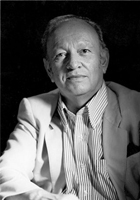From New York Time: 17 — St. Bridget's Day Poem by Derek Mahon
From New York Time: 17 — St. Bridget's Day
A roof over my head, protected from the rain,
I'm reading, pilgrim father, your letters to your son
and wondering if, unlike you, I should head for home.
Escaping the turbulence of this modern Rome
in a flurry of skyline views and exploding foam,
I can see that 747 in flight over Nova Scotia,
Lahinch and Limerick, snoring back to the future;
I can see the old stormy island from the air,
its meteorological gaiety and despair,
some evidence of light industry and agriculture,
familiar contours, turfsmoke on field and town;
I can even hear the cabin crew's soft ‘fáilte'
and the strains of ‘My Lagan Love' as we touch down.
A recovering Ulster Protestant from Co. Down,
I shall walk the Dublin lanes as the days grow shorter,
I who once had poems in The New Yorker,
and spend old age, if any, in an old mac
with the young audibly sneering behind my back,
deafened by seagulls and the playground cries
of children — ourselves, once — by perilous seas.
Now, listening to the rus-in-urbe, spring-in-winter noise
of late-night diners while the temperatures rise
and the terrible wind-chill factor abates, I realize
the daffodils must be out in ditch and glen
and windows soon flung wide to the spring rain;
and marvel how, a figure out of the past,
an old man in a hurry, you stuck it here to the last,
negotiating the icefields of 8th Avenue
to die on West 29th of the ‘Asian' flu.
But first you met by chance at the riverside
a young woman with a sick child she tried to hide
(not out of shame, you felt, but anguished pride),
soft-spoken, ‘from Donnybrook', amid the alien corn.
‘It pained me that her bright image should fade.'
Thus your epiphany, and you wrote to explain:
‘The nightingale sings with its breast against a thorn,
it's out of pain that personality is born.'
Things you understood: children, the human face,
‘something finer than honesty', the kindness
of women and the priority of the real.
Things that puzzled you: economy, fear,
the argument from design, the need to feel secure,
the belief in another world besides this one here.
Despite your rationalism, did it ever appear
that the universe might be really ‘magical', sir,
and you yourself a showing-forth of that soul?
‘Art is dreamland.' When you rejoined the whole
what glimpse was given to you in the black hole?
Now, to ‘Yeats, Artist and Writer', may we add
that you were at home here and in human nature
but also, in your own words, lived and died
like all of us, then as now, ‘an exile and a stranger'?
This poem has not been translated into any other language yet.
I would like to translate this poem